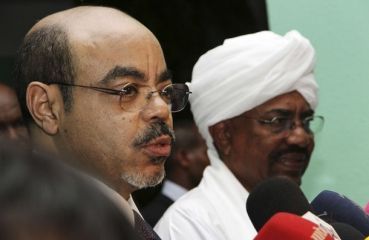Sudan’s Bashir pays tribute to Ethiopia’s Zenawi
September 1, 2012 (KHARTOUM) — Sudan’s President Omar al-Bashir paid a glowing tribute to the late Ethiopian Prime Minister Meles Zenawi after his arrival Saturday in Addis Ababa to take part in the state funeral on Sunday.

Speaking after his arrival in Addis Ababa, the Sudanese president said Zenawi is a big loss, not just for Sudan, but the whole region.
He said Zeanwi was a great leader but “we are confident that the Ethiopian people are able to continue along the process of development and construction and reunification of Ethiopia to support the stability in the (east) African region,” he stressed.
Zeanwi, 57, died on 20 August in Brussels where he was treated for an undisclosed illness.
Bashir supported his successful toppling of the former communist regime in Addis Ababa, which supported the former South Sudanese rebels, the SPLM, who are now the ruling party of the Republic of South Sudan. But Zenawi managed to have a balanced relation with the former South Sudanese rebel group even before South Sudan’s independence last year.
President Bashir noted that Zenawi’s facilitation of the negotiations between Sudan and South Sudan was trusted by all parties and played a crucial role in bridging gaps and overcoming the obstacles.
Bashir also disclosed that he had a personal and strong relationship with Zenawi describing him as an “intimate and friendly” person. He added that he personally contributed to clear all the problems between Sudan and Ethiopia.
“When a problem occurs we did not need for an external mediation or external meeting but personal relationships were the most important element to resolve problems and return to normal relations.”
Sudan and Ethiopia despite tensions along the border between farmers and because of cross-border attacks by Ethiopian rebel groups developed good relations and established a number of joint projects. Also regular meetings are held between the governors of bordering states from the two sides.
Khartoum also prevented the Ethiopian opposition and rebel groups who traditionally had an active presence in Sudan from working against the Ethiopian regime. However, Sudan remains open to the nationals from the neighbouring country.
Bashir attempted many times to ease tensions between Eritrea and Ethiopia but Asmara has always insisted that Addis Ababa remove its soldiers from the disputed border of Badme town was a precondition to any improvement in their relationship.
Khartoum has also thought to establish a strong regional integration with Eritrea and Ethiopia but the project was prevented by the liberation war in Eritrea. Now the conflict between Addis and Asmara still obstructs such realisation.
(ST)
